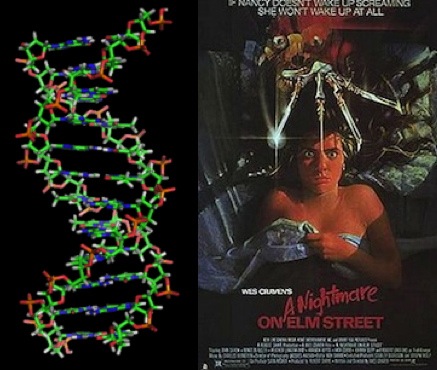 Evolution
Evolution
Mathias Clasen Prize Will Recognize Outstandingly Ludicrous Evolutionary Theorizing

In an oversight that has too long gone uncorrected, ENV has until now failed to develop an appropriate framework for regularly and formally spotlighting the work of scholars hard at work producing the most ludicrous evolutionary explanations of whatever you can think of. We apologize for the tardiness. But hey, better late than never, we hereby announce the establishment of the Mathias Clasen Prize.
A Dutch researcher at the Aarhus University, for whom the prize is named, Dr. Clasen is in the news with his theory explaining the widespread taste for horror movies and fiction. If you’ve ever enjoyed a Stephen King novel or a feature film by Wes Craven, it all goes back to the East African savannah. Doesn’t everything? “When our ancestors lived as hunter-gatherers in the East African savannah, it was important that they were prepared for possible attacks by predators and vermin,” Dr. Clasen explains.
Science Nordic reports:
Clasen has conducted an in-depth study of how our fascination with horror may be linked to human evolution.
He thinks it’s obvious that our fascination with horror is genetic in some way or other. We know that most of our genes are still adapted for a hunter-gatherer lifestyle like the one our distant ancestors lived. It was a life filled with threats and danger.
For many, many thousands of years our ancestors lived on the savannah, where caution was the key to survival. For instance, being disgusted by rotten, disease-causing meat is a safety reflex. And if these people wanted to avoid being eaten, they had to fear lions and other sharp-toothed animals.
As a consequence, according to Clasen’s theory, the fear of rottenness and sharp teeth has become part of our genetic material. This is why we are now scared of vampires with pointy teeth and zombies with rotting carcasses.
Today, we’re unlikely to run into a ferocious lion on our way to the supermarket, yet deep within our DNA we still have a need to prepare ourselves for a fatal lion attack.
When we watch a horror film or read a scary book, we’re acting out this desire to exercise our terror preparedness.
“It’s actually just like other mammals’ young, who fight for fun because it makes evolutionary sense later on in life when they will need to fight to the death,” says Clasen.
“We use fiction as an ’emotional simulator’ to broaden our horizons. Horror fiction exercises our reactions to what’s terrible and frightening.”
Granted that avoiding dangerous predators and spoiled meat are requirements of good health, how might this be coded in DNA — what proteins are involved, I wonder — so as to produce an enjoyable response, for example, to the current kitsch obsession with zombies? That’s not exactly clear. It never is.
And hence the need for the Mathias Clasen Prize, without which this marvelous work might go unrecognized. Winners are entitled, on demand, to a kick in the pants.
Image credit: Wikipedia.
